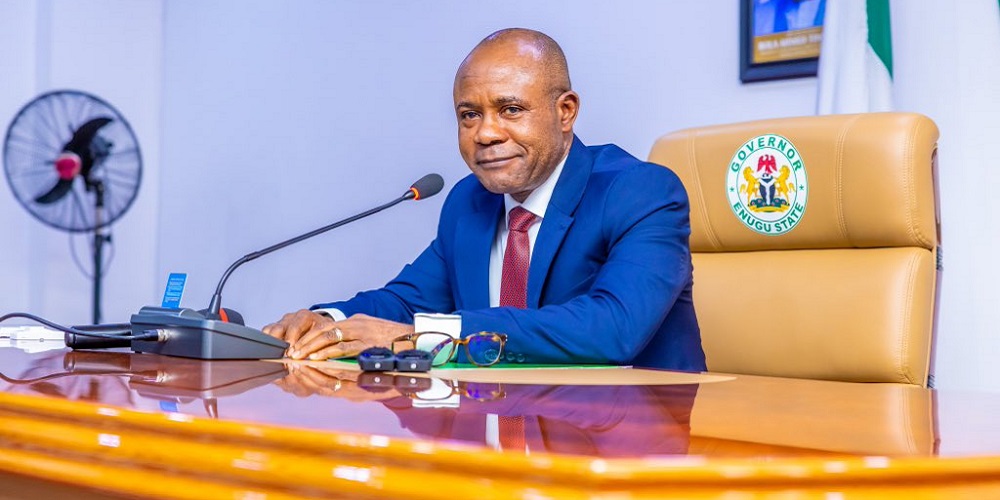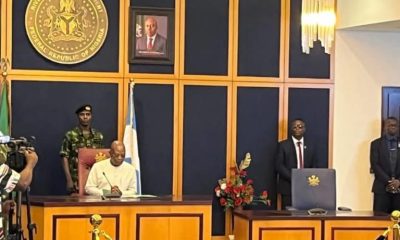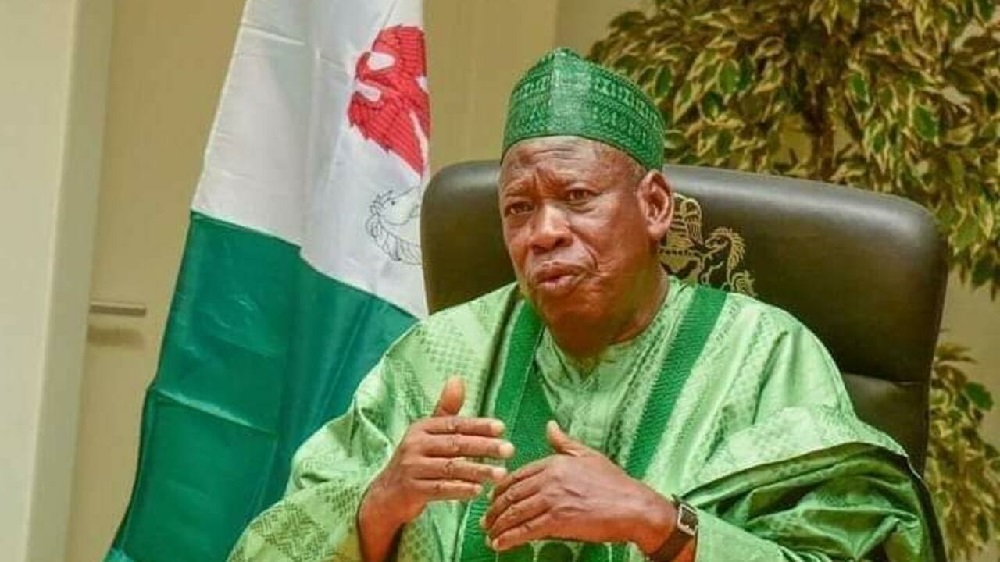News
Despite operational problems, NNPC Ltd’s state of emergency on crude oil production yields 1.61mbpd in July 2024

By Kayode Sanni-Arewa
The declaration of a state of emergency by the Nigerian National Petroleum Company Limited [NNPC Ltd] on crude oil production has yielded a positive outcome with the increase recorded in daily production from 1.25 million barrels per day [mbpd] in June to 1.61mbpd as of July 23, 2024.
Group Chief Executive Officer of NNPC Ltd, Mr Mele Kyari had declared the state of emergency at the end of June/early July in a speech at the 2024 Nigeria Oil and Gas (NOG) Energy Week in Abuja.
Mr Kyari said the move was directed towards increasing Nigeria’s crude oil production and growing its reserves.
According to him “We have decided to stop the debate. We have declared war on the challenges affecting our crude oil production. War means war. We have the right tools. We know what to fight. We know what we have to do at the level of assets. We have engaged our partners. And we will work together to improve the situation.”
He had explained that a detailed analysis of assets showed that Nigeria could conveniently produce two million barrels of crude oil per day without deploying new rigs, but the major impediment to achieving that remained the inability of players to act in a timely manner.
“War will help NNPC Ltd and its partners to speedily clear all identified obstacles to effective and efficient production such as delays in procurement processes, which have become a challenge in the industry,” he said.
And about a month after, the Nigerian Upstream Petroleum Regulatory Commission (NUPRC) has just announced the increase in the daily crude oil production in the country from 1.25 million barrels per day (mbpd) in June to 1.61 mbpd as of July 23rd.
The increment in output, according to the Commission, was in spite of significant operational challenges especially affecting terminals at Bonny, Brass, and Forcados, prompting the Commission to employ end-to-end production monitoring and a mass balance methodology to accurately account for losses and differentiate them from operational losses.
The announcement by the NUPRC has generated positive sentiments in the oil sector of the national economy with its potential for more revenue accretion to the federal government’s coffers.
Chief Executive Officer of the Commission, Engineer Gbenga Komolafe dropped the piece of good news at the House of Representatives’ Special Committee’s Two-Day Public/Investigative Hearing on Oil Theft/Losses in Abuja at the weekend.
An elated Komolafe said that Nigeria remained Africa’s largest producer of crude oil, boasting proven reserves of 37.50 billion barrels and a production capacity of approximately 2.19 million barrels per day (mbpd).
According to him: “Nigeria is facing significant challenges, especially affecting terminals at Bonny, Brass, and Forcados. This has prompted the Commission to employ end-to-end production monitoring and a mass balance methodology to accurately account for losses and differentiate them from operational losses.
“The NUPRC has introduced several innovative measures to enhance transparency and accountability.”
He listed other innovations towards accountability to include the Advanced Cargo Declaration (ACD) Regulation that ensures no crude oil is exported without proper accounting and that assigns a unique identification number (UIN) to each cargo; the Upstream Metering Regulation, which mandates reliable metering systems to account for all hydrocarbon production and exports; and, real-time cargo tracking and digital documentation to improve visibility and efficiency in cargo operations.
He explained that with a mandate to oversee the exploration, development, production, and lifting operations of crude oil and natural gas, “the NUPRC regulates both the technical and commercial aspects of operations in the nation’s Upstream Petroleum Sector, ensuring optimal tax revenue generation, royalty collection, and cost benchmarking.
“Other areas of major focus for the Commission include ensuring business continuity and production sustainability at low costs, accurate measurement and timely payment of royalties, uninterrupted crude oil and natural gas supply to the domestic market, and maintaining safety, health, and environmental standards.
“The Petroleum Industry Act 2021 grants the Commission several statutory mandates in the areas of calibration and certification of metering systems and equipment, publication of reports and statistics on upstream operations, regulatory oversight and issuance of quality and quantity certificates for exports, and determination of fiscal prices for crude oil and condensate.”
Komolafe stated that the strategies of the Commission aimed to optimise production, enhance regulatory oversight, and ensure accurate measurement and accounting.
He further said that the Commission had prioritised improving rig availability and reducing non-productive time through unlocking heavy crude oil reserves via industry workshops.
“These initiatives also support new Petroleum Prospecting License (PPL) awardees to achieve their first Oil, among other initiatives,” he explained.
He reaffirmed NUPRC’s commitment to continued engagements with stakeholders to optimise Nigeria’s Oil production and maintain its leadership position in Africa’s energy sector.Despite operational challenges, NNPC Ltd’s state of emergency on crude oil production yields 1.61mbpd in July 2024
The declaration of a state of emergency by the Nigerian National Petroleum Company Limited [NNPC Ltd] on crude oil production has yielded a positive outcome with the increase recorded in daily production from 1.25 million barrels per day [mbpd] in June to 1.61mbpd as of July 23, 2024.
Group Chief Executive Officer of NNPC Ltd, Mr Mele Kyari had declared the state of emergency at the end of June/early July in a speech at the 2024 Nigeria Oil and Gas (NOG) Energy Week in Abuja.
Mr Kyari said the move was directed towards increasing Nigeria’s crude oil production and growing its reserves.
According to him “We have decided to stop the debate. We have declared war on the challenges affecting our crude oil production. War means war. We have the right tools. We know what to fight. We know what we have to do at the level of assets. We have engaged our partners. And we will work together to improve the situation.”
He had explained that a detailed analysis of assets showed that Nigeria could conveniently produce two million barrels of crude oil per day without deploying new rigs, but the major impediment to achieving that remained the inability of players to act in a timely manner.
“War will help NNPC Ltd and its partners to speedily clear all identified obstacles to effective and efficient production such as delays in procurement processes, which have become a challenge in the industry,” he said.
And about a month after, the Nigerian Upstream Petroleum Regulatory Commission (NUPRC) has just announced the increase in the daily crude oil production in the country from 1.25 million barrels per day (mbpd) in June to 1.61 mbpd as of July 23rd.
The increment in output, according to the Commission, was in spite of significant operational challenges especially affecting terminals at Bonny, Brass, and Forcados, prompting the Commission to employ end-to-end production monitoring and a mass balance methodology to accurately account for losses and differentiate them from operational losses.
The announcement by the NUPRC has generated positive sentiments in the oil sector of the national economy with its potential for more revenue accretion to the federal government’s coffers.
Chief Executive Officer of the Commission, Engineer Gbenga Komolafe dropped the piece of good news at the House of Representatives’ Special Committee’s Two-Day Public/Investigative Hearing on Oil Theft/Losses in Abuja at the weekend.
An elated Komolafe said that Nigeria remained Africa’s largest producer of crude oil, boasting proven reserves of 37.50 billion barrels and a production capacity of approximately 2.19 million barrels per day (mbpd).
According to him: “Nigeria is facing significant challenges, especially affecting terminals at Bonny, Brass, and Forcados. This has prompted the Commission to employ end-to-end production monitoring and a mass balance methodology to accurately account for losses and differentiate them from operational losses.
“The NUPRC has introduced several innovative measures to enhance transparency and accountability.”
He listed other innovations towards accountability to include the Advanced Cargo Declaration (ACD) Regulation that ensures no crude oil is exported without proper accounting and that assigns a unique identification number (UIN) to each cargo; the Upstream Metering Regulation, which mandates reliable metering systems to account for all hydrocarbon production and exports; and, real-time cargo tracking and digital documentation to improve visibility and efficiency in cargo operations.
He explained that with a mandate to oversee the exploration, development, production, and lifting operations of crude oil and natural gas, “the NUPRC regulates both the technical and commercial aspects of operations in the nation’s Upstream Petroleum Sector, ensuring optimal tax revenue generation, royalty collection, and cost benchmarking.
“Other areas of major focus for the Commission include ensuring business continuity and production sustainability at low costs, accurate measurement and timely payment of royalties, uninterrupted crude oil and natural gas supply to the domestic market, and maintaining safety, health, and environmental standards.
“The Petroleum Industry Act 2021 grants the Commission several statutory mandates in the areas of calibration and certification of metering systems and equipment, publication of reports and statistics on upstream operations, regulatory oversight and issuance of quality and quantity certificates for exports, and determination of fiscal prices for crude oil and condensate.”
Komolafe stated that the strategies of the Commission aimed to optimise production, enhance regulatory oversight, and ensure accurate measurement and accounting.
He further said that the Commission had prioritised improving rig availability and reducing non-productive time through unlocking heavy crude oil reserves via industry workshops.
“These initiatives also support new Petroleum Prospecting License (PPL) awardees to achieve their first Oil, among other initiatives,” he explained.
He reaffirmed NUPRC’s commitment to continued engagements with stakeholders to optimise Nigeria’s Oil production and maintain its leadership position in Africa’s energy sector.
News
Mbah mourns ,says Christian Chukwu was a ‘football icon’

By Kayode Sanni-Arewa
Enugu Governor Peter Mbah has expressed deep grief over the passing away of former Super Eagles skipper and coach, Christian Chukwu, describing him as a football icon, titan, and phenomenon.
Reacting to the development on Saturday Mbah said: “I received with a deep sense of loss the passing away of Chairman Christian Chukwu. It is a personal loss to us as Ndi Enugu, his home state, and indeed to Nigeria as a nation and Africa as a continent.
“Christian Chukwu was a national icon, a football titan, field marshal, and phenomenon. His exploits as a footballer united the country across ethnic divides and creed.
He was patriotism personified, serving the nation and Africa unreservedly both as a player and coach of the highly successful Rangers International Football Club of Enugu and Super Eagles of Nigeria, which he captained to victory as Green Eagles at the 1980 Africa Cup of Nations, AFCON. He also coached the Harambee Stars, Kenya’s senior male national team, among others.
“Chairman, as he was fondly called, gave his all not only to the nation but to the rest of Africa. He wrote his name in gold in the annals of the history of Nigerian and African football.
Our dear legend has gone the way of all mortals, but the fond memories and the pride he gave Ndi Igbo and Nigeria as a whole will be cherished forever.
“My heart goes out to his family, Ndi Enugu, the Nigerian sports community and the entire nation over this irreplaceable loss. May the good Lord grant his soul eternal repose.”
News
Just in: Boko Haram IED Blast Kills Seven Along Maiduguri-Damboa Road

By Kayode Sanni-Arewa
No fewer than seven people lost their lives on Saturday following the detonation of an Improvised Explosive Device (IED) planted by Boko Haram terrorists in Borno State.
The deadly incident occurred along the Maiduguri-Damboa Road, a notorious route that cuts through the Sambisa Forest—an area long plagued by insurgent activities.
The victims were part of a convoy of vehicles being escorted by the military from Damboa to Maiduguri.
According to eyewitness accounts and local sources, the explosion struck as the convoy—organized to provide safe passage through the volatile region—was underway. Several other passengers sustained varying degrees of injuries and were rushed to a hospital in Maiduguri for urgent treatment.
The Maiduguri-Damboa Road serves as a vital link between the state capital and several local government areas in southern Borno, including Chibok and Gwoza.
For years, the route remained closed to civilian traffic due to persistent terrorist threats. However, under the administration of Governor Babagana Zulum, the road was reopened, with military escorts deployed to accompany travelers twice weekly after clearing the area for explosives.
Saturday’s attack raises fresh concerns about the safety of the corridor, despite consistent military presence. The blast also comes just days after Governor Zulum publicly raised alarm over renewed Boko Haram activity in the state, highlighting the persistent threat the group poses to peace and development in the region.
Authorities are yet to release an official statement on the incident, while investigations and security operations in the area continue.
News
Insecurity: Criminals Cart Away NSA Ribadu’s Office Hilux During Juma’at Prayer In Abuja

By Kayode Sanni-Arewa
The Federal Capital Territory (FCT) Police Command has initiated a search following the theft of a black Toyota Hilux vehicle belonging to the Office of the National Security Adviser (ONSA), Nuhu Ribadu, which was stolen during Friday’s Juma’at prayers in Abuja.
It was gathered that the vehicle was parked around 1:05pm opposite the Abuja Municipal Area Council (AMAC) complex in Area 10, while the official attended prayers at a nearby mosque.
Security source, Zagazola Makama, disclosed the incident via his X (formerly Twitter) handle, revealing that the ONSA official returned from the mosque only to find the vehicle missing.
According to him, a sources said the theft was immediately reported to the Garki Police Division at approximately 2:00 p.m., leading to a swift response by law enforcement.
Meanwhile, the FCT Police Command promptly activated a stop-and-search operation at various checkpoints and across all entry and exit points in the capital city.
Police authorities confirmed that investigations are ongoing and all efforts are being made to apprehend the culprits and recover the vehicle.
The Command said it had intensified efforts to track down the fleeing suspects and recover the stolen Hilux.
-

 News16 hours ago
News16 hours agoInsecurity: Criminals Cart Away NSA Ribadu’s Office Hilux During Juma’at Prayer In Abuja
-

 News24 hours ago
News24 hours agoIbas gives reasons why Sole Administrators were appointed for Rivers councils
-

 Opinion19 hours ago
Opinion19 hours agoDismantling the false Narrative of a “Coup” in Rivers State
-

 News19 hours ago
News19 hours agoOERAF Rounds Up Late Chief Ekuogbe Rowland Akpodiete’s remembrance with Novelty Match
-

 News23 hours ago
News23 hours agoUS embassy announces new requirements for visa interviews for Nigerian applicants
-

 Politics17 hours ago
Politics17 hours ago2027 Beautiful bride: After Atiku visits Buhari, Ganduje leads APC delegation to Kaduna
-

 News23 hours ago
News23 hours agoFive countries with easy work visas in 2025
-

 Sports14 hours ago
Sports14 hours agoSAD! Most popular ex-national football team captain, Christian Chukwu is dead






